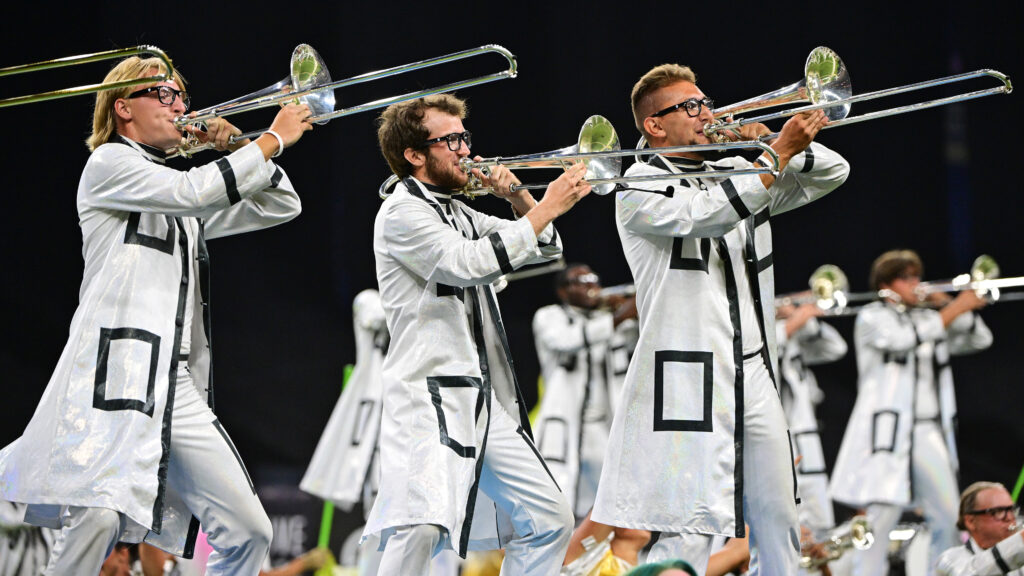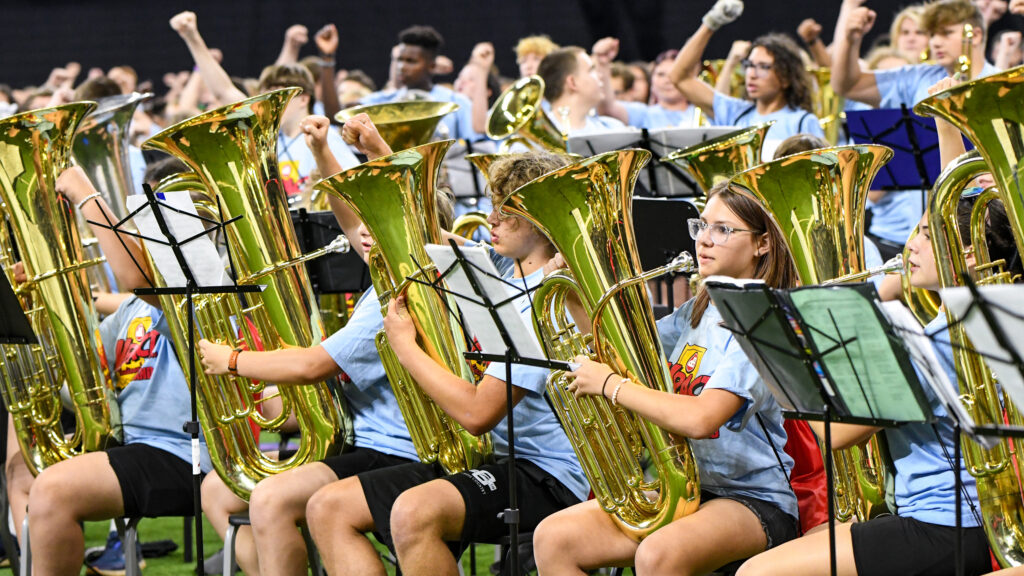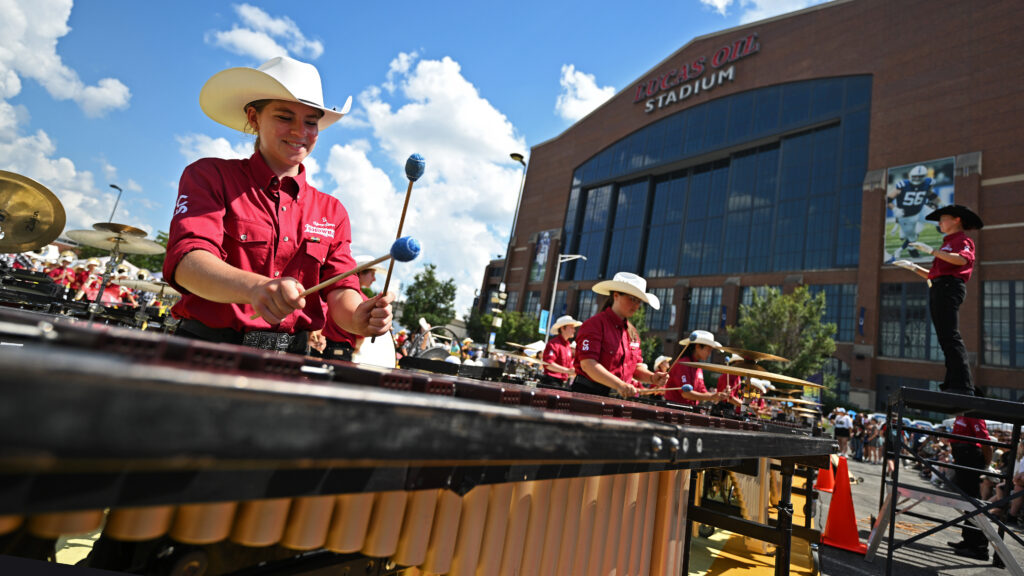The Drum Corps International board of directors embarked on an aggressive approach to getting to the root of two major issues on the minds of all corps at this past weekend’s meeting of the directors: parity and financial stability for the individual corps and DCI as an entity. Senior board member George Hopkins volunteered to lead the board through a series of exercises and discussion formats which was graciously accepted. Mr. Hopkins set the tone for the discussion so that the quietest and the most verbose of the members in attendance would feel they had equal input and by all accounts they did.
The Friday evening session centered on each corps representative to the DCI board getting to know each other. While most members in the room have been acquaintances through their board association for some time, how well they really knew each other as people inside and outside of the activity was challenged and addressed through a couple of exercises facilitated by Mr. Hopkins. There were lots of laughs and even a few tears as the corps representative shared their experiences and their personal commitment to serve youth through the drum corps experience. While the three hour session caused many to better understand the person sitting next to them it was also recognized that everyone in the room had a strong passion to further improve as an individual leader and as a collective of leaders through Drum Corps International.
Saturday morning’s session opened with a discussion on parity. Parity is a word that a handful of directors have used in recent years to describe their concern to make sure there is an environment for success established so that all corps have equal access to the opportunity to grow as organizations off the field and performing groups on the field. Several points were brought forth with much of the discussion centering on aspects that might be better aligned in order to establish increased balance among all that desire to participate in Drum Corps International. Most of the discussion touched upon financial need, leadership within each corps, and the desire to create a level competitive playing field.
It was noted that the demands of the tour have increased due to the evolution of the difficult dynamics of the scheduling process. Although it goes without saying that corps placing at the top competitively enjoy more attention from fans and Tour Event partners through support and facilities respectively there was much concern expressed for how corps not at the top competitively might some day achieve similar access without necessarily achieving top end competitive success. Further it was acknowledged that corps at the top competitively have for years served to support the sensitive balance mechanism within DCI’s structure. The most profound observation from all the corps representatives present at the meeting was that the 24th place corps and the 1st place corps provides equally what is considered to be a life changing experience for youth through the drum corps experience.
All involved in the discussion on parity recognized that many of the aspects involved in creating such are extremely difficult to tackle. The goal of the discussion was to come up with action items to improve upon that might lead to more parity among the member corps. Rehearsal time was a point that came about as something that could be addressed. Specifically, all corps in a given Tour Event (contracted, non-major event) typically have an equal distance to travel to and from the next event. Because of the dynamics of the tour that have caused there to be a further distance in miles and the need to spread shows apart with respect to the calendar so that one Tour Event does not impose upon another, demands on corps travel have increased in recent years. Corps used to average 250 miles between stops on tour and are now averaging more than 300 miles plus a night adding at least another hour to the travel each day.
Because of the current structure of each Tour Event which includes the corps performance, a full retreat (or finale), and most often an encore, corps that appear at 7:30 P.M. often have to wait for two to three hours in full uniform for the retreat to begin. While every corps can leave an event at the same time the corps performing earlier experience two to three hours less rehearsal, rest, or free time than those performing later in the evening. When adding up even one hour a day of rehearsal time four days a week times eight weeks it is clear this is a significant issue for creating parity on the field. By eliminating the retreat, corps performing at 7:30 p.m. would gain the flexibility to depart sometimes before the event is over in order to have the same amount of available time as the corps that steps off at 9:30 p.m.
As a result of the discussion pertaining to time available in a day for each corps, the DCI board of directors voted to eliminate the retreat at Tour Events in order to balance the opportunity for flexibility in scheduling for each corps day. Because most of the corps in the room are also Tour Event Partners for DCI they too discussed that eliminating retreat at Tour Events would be disappointing for the audience at each event. In order to maintain what has become a major part of the end of each event, it was agreed that each event would have a scheduled encore after the last competitive corps performance. In the past the encore was left up to the champion of the night but there was agreement that every corps on the tour should be given an opportunity to perform an encore in order to demonstrate that each corps that participates has significant value regardless of competitive placement. Details of the scheduling of encores will be established before the schedule for 2005 is finalized. Retreats will take place at select major events throughout the tour including the world championship finals and it was agreed among the Division I corps to solicit the Division II & III corps input with regards to this strategy when the topic appears on their late October meeting agenda.
The corps representatives also discussed allowing the officials that schedule the corps to design the draw order to allow for corps that typically have to go on first all the time to have the opportunity to go on later in events from time to time. The idea of a random draw at Tour Events was not embraced as corps wish to compete among competitive groupings, however it is those groupings that might change to accommodate a mix in line up while attempting to maintain the flow of an event spectators have come to expect. Draw order for the major events will be discussed at the January DCI board of directors meeting.
The judges critique typically held after each Tour Event has also been eliminated by a unanimous vote of the corps representatives. Often times corps keep their caravan together and wait until critique ends before they leave an event. Now they will have a choice regarding departure from the show site. It was agreed upon that a new system of receiving input through productive dialogue with the judges a few times throughout the season will need to be established. A proposal for a new format will be presented at the meeting in January.
Other issues addressed as a result of the discussion on parity included the need for more direction from the DCI board to the judges as to the execution of the current adjudication system. Another issue is the inclusion of all corps in the promotion of the activity. It was acknowledged that DCI.org has been an “excellent” balance in reporting and promoting corps at all levels but print and broadcast television fall short. Details such as the location of souvenirs being tilted to competitive success along with corps housing locations were discussed.
And finally and likely the most important action of the weekend related to the discussion on creating more parity was the commitment to share core competencies among the corps organizations. From rehearsal and show design techniques to board and management development, steps are being taken to include several discussions at the January meeting for a meaningful exchange much like was available at the director’s colleges that have been non-existent for the past few years.
Also underway is an extensive and comprehensive survey each corps has been asked to complete that includes all aspects of a drum corps operation including: budget, staff, transportation and the like. The launching of the survey is in support of the discussion on financial stability that followed the discussion on parity. Many concerns were raised that focused on the rising cost of doing business using the current model of drum corps operations. Transportation costs were at the top of the list because of rising fuel costs, the cost of owning and operating busses versus chartering, and rising food costs. It is becoming more and more difficult to raise the amount of money necessary to keep pace. It is likely that the tour model and the demand placed on corps to participate will be addressed aggressively in the near future business planning for DCI. An evaluation of the current pay model for corps through DCI will also take place by a committee to determine opportunities to reward competitive excellence while ensuring financial stability for each of the member corps.
As time ran out on the open discussion of the various topics along with the getting to know each other session from the night before, it was apparent that the DCI board of directors had consensus on the issues at hand as well as agreement to keep the process moving to address each topic to a conclusion followed by action. At the opening of the business meeting, the vote was taken on eliminating retreats and critiques at Tour Events which was passed unanimously. Also passing unanimously was the elimination of caption awards at world championships. Although the scoring system will by default show the highest scoring captions it is believed that the caption awards diluted the overall team effort of what a corps brings to the competition. It was further agreed that the awards that were named in the memory of esteemed contributors to the activity would transfer to recognition through a scholarship program to be developed.
At the business meeting, reports closing out the season were presented. The Division II & III report by George Brown, chairman of the advisory committee and JW Koester, DCI Division II & III coordinator offered up what was the most positive report in the history of this group. They successfully executed 25 events for Division II & III corps in a three week period. This compares to 18 events in 2003 which followed an average of 12 events for many years. The work of the Division II & III directors and JW was acknowledged with continuing support of their efforts by the DCI board of directors.
The longest phase of the business meeting dealt with the 2005 budget proposal presented by the DCI executive director, Dan Acheson and DCI controller and operations director, Wayne Leide. The original version of the 2005 budget was presented to the DCI executive committee in April of 2004 and then further reviewed and tweaked at the DCI finance committee meeting in early September. After a lengthy discussion it was determined that the budget approval would be postponed pending further work by the office staff to identify additional opportunities to significantly increase net income and resulting financial distributions to the corps in 2005.
Integrated in the budget presentation and discussion was a projection of financial results of the 2004 fiscal year. Projections indicate that the year will end on a strong basis largely due to increased attendance at major events and the increase in the demand for DCI merchandise. The emergency distribution of funds for corps to offset rising fuel costs that occurred in June and July in the amount of $135,000 while not budgeted, will likely be covered by the events of this year as well.
It was acknowledged by several board members that DCI’s current positive financial position is significant to what they need in order to continue growing, but there must be a ramped up attack on generating more revenue through DCI’s efforts for the collective in order for corps to sustain their operations; primarily related to touring. While DCI as an organization has managed to develop more stability financially, organizationally, and operationally, DCI has much more work to do to deliver the much needed cash required to assist corps at all levels. The Drum Corps International board of directors extends its most heartfelt gratitude to fans, tour event partners, and volunteers who make each season possible. We hope that the release of this information helps to better understand our decision making process and we recognize that not all decisions will be favorable to all. Your unconditional support and faith in what we are trying to do to preserve and promote the drum corps experience is much appreciated. Thank you!
The next meeting of the Drum Corps International board of directors is scheduled for Jan. 20 through 23, 2005.





